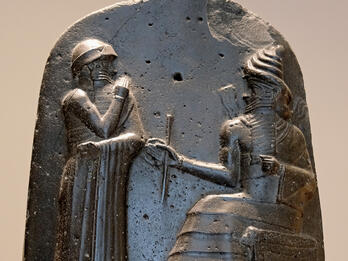The Term Torah and Its Meaning
The Hebrew Bible has many terms for law, including torah, which came to mean not just biblical law but all authoritative Jewish teaching.
What is “law” in the Hebrew Bible?
The Bible has many terms for “law”: mitsvah (“commandment”), ḥok (“rule”), mishpat (“judgment”), edut (“decree”), pikudim (“precepts”), davar (“word”), and derekh (“way”). But the most important term is Torah. Torah is often translated as “law,” beginning with the Greek translation of Torah as nomos (“law”) in the Septuagint, the first Bible translation.
Although the bulk of the Bible’s laws are found in the Torah (the Pentateuch, or Five Books of Moses), the term torah is much broader than “law.” Its basic meaning is “teaching, instruction,” and it includes human and divine teaching and oral commands and written documents. As the title of a specific book, Torah was first used for Deuteronomy, and it was then extended to the entire Pentateuch. Later in Jewish tradition, Torah came to include all of biblical and rabbinic literature (the written law and the oral law) and then all discourse on biblical and rabbinic literature. Ultimately, Torah came to encompass the entire spectrum of authoritative Jewish religious teachings throughout history. It is the central concept in Judaism whose roots are in the Bible. In the Posen Library, when the term refers to a specific body of divine teachings, it is capitalized.
Law Collections in the Torah
Most of the laws in the Torah appear in five separate collections:
The Ten Commandments (Exodus 20:2–14, repeated in Deuteronomy 5:6–17)
The Book of the Covenant (Exodus 20:19–23:33)
Laws about the Tabernacle and Sacrifices (Exodus 25–31; Leviticus 1–16; and various laws in Numbers)
The “Holiness Collection” (Leviticus 17–26)
The Laws of Deuteronomy (Deuteronomy 11:31–28:69)
Did biblical laws function like modern law codes?
The law collections are not complete codes—that is, they do not cover all topics or cases (for example, they lack laws about weddings and commerce). Unlike modern law codes, these collections are not freestanding documents. They are all embedded within narrative or rhetorical contexts that tell when they were given and establish their authority. All the laws are said to be authored by God, not by human authorities. For that reason, obeying and studying the laws are not only aspects of good citizenship but also religious virtues, and violation of the laws is not only an offense against society but also a sin, an absolute wrong. Many of the laws are formulated in the second person, addressed directly to the people, indicating that everyone, individually and as a society, was responsible for implementing them. To add to the laws’ persuasiveness, many contain clauses that explain them or motivate people to observe them. In some cases, by obeying certain laws the people are emulating God (Leviticus 19:2; Deuteronomy 10:18–19).
In the Bible’s law collections, religious laws and moral exhortations are commingled with civil and criminal laws. This has been explained as due to the belief that all binding norms come from God. As a result, the festival and sacrificial regulations, exhortations against mistreating blind and deaf persons, and laws of charity are no less part of the legal system than are the laws governing theft and murder.
Were biblical laws enforced in ancient Israel?
There are inconsistencies and duplications among the law collections. For example, there are multiple versions of the festival calendar, of the law limiting the period of indentured servitude or debt slavery, and of laws requiring farmers to leave part of their crops in the field for the poor. These inconsistencies and duplications suggest that the law collections developed, for the most part, independently of one another and may reflect the views of different times, places, or groups. In some cases, the laws in one collection may represent a revision or reinterpretation of the laws in another collection. These law collections were not blended together or harmonized into a single, integrated whole but were left separate even when the narrative sources in which they are embedded were woven into a single running narrative; this may indicate that they had acquired a quasi-canonical status earlier than the narratives did. But we do not know whether these collections reflect the binding statutory law of any place or places in ancient Israel or are only literary statements illustrating certain ideal principles of justice and religion. The resolution of the discrepancies between these collections became a fundamental feature of rabbinic exegesis in later times.
Not every law in the Torah is included in these collections. Certain individual laws appear within narratives that recount the occasion that gave rise to them, such as the laws about circumcision in Genesis 17, the calendar year and Passover in Exodus 12, and the Sabbath in Exodus 16. In addition, the Torah reports a number of instances when no applicable law was known and Moses asked God for a ruling. In most such instances, the ruling is then stated, or restated, as a general law to be followed whenever the same situation arises again.


